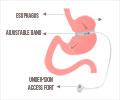Is weight loss surgery a boon or bane for a relationship? Singles who undergo bariatric surgery to lose weight are more likely to get married and couples get divorce.
Highlights
- Weight loss surgery can either build or break a happy marriage
- Singles were more likely to start a relationship and couples were more likely to split after undergoing bariatric surgery
The study, published in Wolters Kluwer’s Annals of Surgery Open, is the first to characterize marital outcomes among US adults who underwent bariatric surgery, giving patients and doctors concrete data on changes in romantic relationships post-surgery.
“Weight loss is generally the goal of bariatric surgery, but people have a variety of motivators for wanting to lose weight – for example, remission of Type 2 diabetes and improvement in joint pain,” said lead author Wendy King, Ph.D., Associate Professor of Epidemiology at Pitt Public Health. She added that: “Patients have also described the desire for romantic partnership or improving relationships as important motivators. Before this study, we had no quantitative data in the US on how marital status changes after bariatric surgery – are patients more likely to get married, divorced or find romantic stability.”
Read More..
Can Weight Loss Surgery Help You Get Married or Divorced?
King and her colleagues examined data on 1,441 U.S. adults who, between 2006 and 2009, underwent Roux-en-Y gastric bypass or sleeve gastrectomy, the two most common and effective surgical treatments for severe obesity. The participants ranged in age from 19 to 75 years old, and 79% were women. At the time of surgery, 62% were married or living with a partner, while the rest were separated, divorced, widowed or had always been single.The participants were enrolled in the National Institutes of Health-funded Longitudinal Assessment of Bariatric Surgery-2 (LABS-2), a prospective, cohort study of patients undergoing weight loss surgery in the US.
Consistent with previous studies in Scandinavia, the vast majority of the LABS-2 participants maintained their relationship status for the five years they were followed after surgery, with 81% of married participants staying married and 70% of always-single participants staying single. But 18% of unmarried participants got married, compared to 7% of the general US population; and 8% of married participants got divorced, compared to 4% of the general population. An additional 5% of married participants who did not get divorced got separated.
Why is Divorce Rate So High after Bariatric Surgery?
There were a variety of factors that increased the odds of a participant having a change in relationship status post-surgery, King noted. Some were expected: Younger participants and those living with a partner before surgery were more likely to get married throughout the following five years. But, some were more surprising. For example, the amount of weight lost was not associated with whether someone got married but with improved physical health .However, weight loss did matter when it came to separation and divorce: Participants who lost more weight were more likely to get separated or divorced, as were those who reported an increase in sexual desire post-surgery.
“This could indicate that a patient’s changing lifestyle post-surgery put them out of sync with their spouse,” King said. “It can be really hard when one spouse changes what they eat and how active they are, and desires more sexual activity, while the other doesn’t. That can put significant strain on a marriage. It may be important for couples to consider this and have strategies to maintain their connection after surgery.”
King noted that the LABS-2 study did not ask participants whether a desire to change their romantic relationship status was among their motivations for getting bariatric surgery, so the team could not determine if the participants who got married or divorced went into surgery hoping for a change.
“Our relationships with others – particularly lifelong partners – have been shown to have a profound impact on our health, both physical and mental,” said King. “It will be important for future studies to disentangle the directionality of the various associations between bariatric surgery and relationship status that we uncovered in this study so doctors can best counsel their patients and manage expectations before and after surgery.”
Reference:
1. Changes in Marital Status Following Roux-en-Y Gastric Bypass and Sleeve Gastrectomy: A US Multicenter Prospective Cohort Study - (http://dx.doi.org/10.1097/AS9.0000000000000182)Source-Eurekalert
















